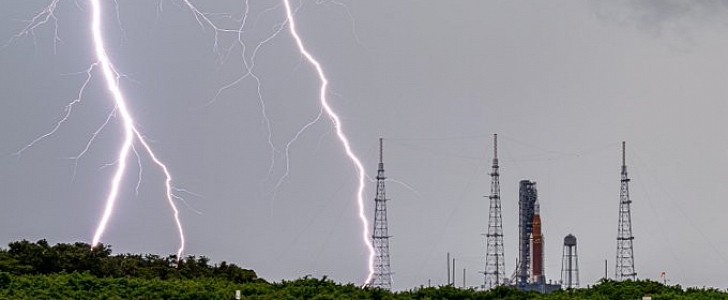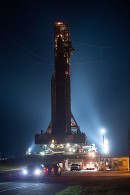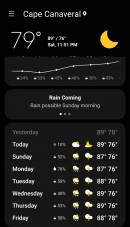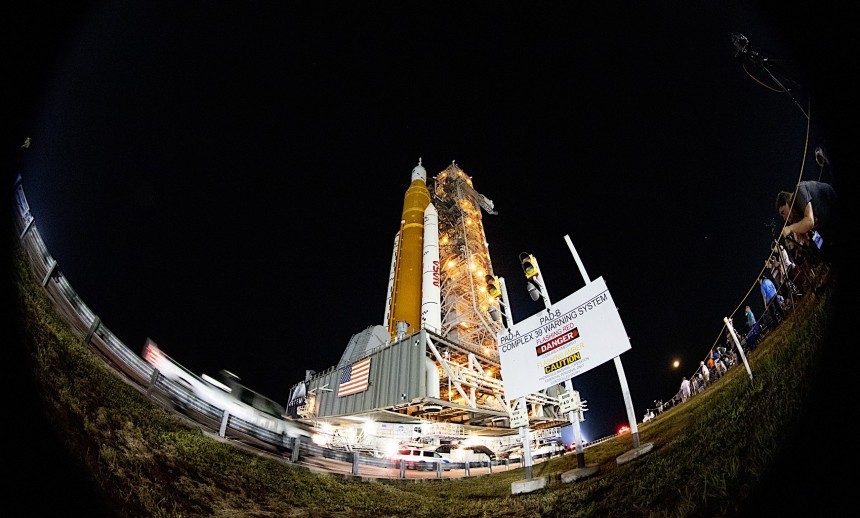As of Sunday, August 28th, 2022, at approximately 10 am, the SLS booster rocket carrying the Orion Space Capsule for NASA's Artemis I mission sits on Launch Pad 39B at the Kennedy Space Center in Cape Canaveral, Florida. All the while, a hidden force may be conspiring against its slim launch window.
NASA personnel have worked grueling schedules in the last week to ensure the big rocket with eight million-plus pounds of thrust at its disposal is ready for its inaugural flight tomorrow morning. All the while, nature appears to be working just as diligently to mess everything up and keep the rocket here on mother Earth. As if to announce that our lord almighty doesn't intend for the big booster and its precious payload to launch on Monday morning.
It was a horror show to behold looking at smartphone weather apps in the days leading up to the momentous launch. As screens showed, wall-to-wall rain events were to occur every day leading up to the launch, including the day of. But it isn't as if such an occurrence is something new. Thunderstorms have been ravaging space launch time-frames for about as long as NASA's been launching them.
Perhaps the most memorable incident of tropical weather-related mishaps during pivotal rocket launches came during the launch of Apollo 12 in November 1969. As many as two confirmed lightning strikes were confirmed to have directly hit the enormous Saturn V rocket, damaging data relay systems on board and making the interior warning lights inside the command module look like a Christman tree.
It was only after Astronaut Alan Bean threw an obscure switch to the auxiliary power supply unit that the problem magically resolved itself, and the crew carried on with their mission to the moon. The anomaly is now commonly called the SCE to AUX incident. So to say, if the Saturn V can shrug off a lightning strike, the new SLS Rocket is assuredly at least as proficient, likely even more so.
But this doesn't mean Artemis I is cleared to launch in any weather conditions Mission Control desires. It's quite the opposite, in fact. Wind conditions, moisture conditions, and a whole host of other environmental factors exhibit profound changes on the rocket in the event it were to hypothetically launch in said conditions. High winds especially are a danger to rockets and their payloads, as they force flight computers, control surfaces, and engine gimbals to work exponentially harder to keep the spacecraft on course.
When the forecast calls for seven straight days of thunderstorms, it makes all the sense in the world for concerns to mount that the launch may need to be scrubbed. As of the day before, the plan is to attempt a launch between a slim and pre-selected time frame between 8:33 am and 10:33 am. In this small launch window, the weather conditions should be at the most optimal they'll be all day.
If the window passes without a launch, a number of things are bound to happen. Firstly, all of the press and personnel on sight will be sent scrambling to extend their hotel, car, and camera rentals. But secondly, one of two new launch windows the following Friday and Monday will immediately become the new targets for SLS and Artemis I. As those are the next two dates, NASA has determined to have the most nominal launch conditions.
With lightning strikes already reported in close proximity to Launch Pad 39B, don't be surprised if one manages to nab the SLS rocket carrying Artemis I between now and the time it heaven willing gets to finally launch. Possibly even as it's in the air.
Whatever happens tomorrow, you'll hear all about it and more right here on autoevolution.
It was a horror show to behold looking at smartphone weather apps in the days leading up to the momentous launch. As screens showed, wall-to-wall rain events were to occur every day leading up to the launch, including the day of. But it isn't as if such an occurrence is something new. Thunderstorms have been ravaging space launch time-frames for about as long as NASA's been launching them.
Perhaps the most memorable incident of tropical weather-related mishaps during pivotal rocket launches came during the launch of Apollo 12 in November 1969. As many as two confirmed lightning strikes were confirmed to have directly hit the enormous Saturn V rocket, damaging data relay systems on board and making the interior warning lights inside the command module look like a Christman tree.
It was only after Astronaut Alan Bean threw an obscure switch to the auxiliary power supply unit that the problem magically resolved itself, and the crew carried on with their mission to the moon. The anomaly is now commonly called the SCE to AUX incident. So to say, if the Saturn V can shrug off a lightning strike, the new SLS Rocket is assuredly at least as proficient, likely even more so.
When the forecast calls for seven straight days of thunderstorms, it makes all the sense in the world for concerns to mount that the launch may need to be scrubbed. As of the day before, the plan is to attempt a launch between a slim and pre-selected time frame between 8:33 am and 10:33 am. In this small launch window, the weather conditions should be at the most optimal they'll be all day.
If the window passes without a launch, a number of things are bound to happen. Firstly, all of the press and personnel on sight will be sent scrambling to extend their hotel, car, and camera rentals. But secondly, one of two new launch windows the following Friday and Monday will immediately become the new targets for SLS and Artemis I. As those are the next two dates, NASA has determined to have the most nominal launch conditions.
With lightning strikes already reported in close proximity to Launch Pad 39B, don't be surprised if one manages to nab the SLS rocket carrying Artemis I between now and the time it heaven willing gets to finally launch. Possibly even as it's in the air.
















